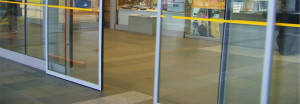DDA
The Disability Discrimination Act – (DDA)
As a service provider, you will no doubt have heard about the DDA (Disability Discrimination Act) and will be eager to know how it will affect the ways in which you do business. This section is intended to provide you with information on the DDA and the ways in which our company can help you to comply with the new legislation. The information contained in this part of the site is intended as a source of information and a guide only. In order to ensure that your company complies with the legislation it may be necessary to have a DDA audit carried out.
What is the DDA?
The Disability Discrimination Act of 1995 was introduced in order to ensure that disabled people were provided with protection against discrimination by both employers and service providers.
Since the introduction of this act is has been unlawful for a service provider to fail to make reasonable adjustments to the way in which the services are provided to disabled people. From October 2004 it will be unlawful for a service provider to fail to make reasonable adjustments to the physical features of service premises in order to overcome physical barriers to access. The service provider has a duty to overcome a physical feature by removing it, altering it or avoiding it.
The Disability Discrimination Act affects all types and categories of service providers including universities and colleges, hotels, offices and shops.
From 2004, where a physical feature makes it impossible or unreasonably difficult for disabled customers to make use of a service offered to the public, service providers will have to take steps, where reasonable, to:
- Remove the feature, or
- Alter it so that it no longer has that effect, or
- Provide a reasonable means of avoiding the feature, or
- Provide a reasonable alternative method of making the service available to disabled people (this fourth duty has been in force since October 1999).
’Physical features’ are defined under the Act as anything on the premises arising from a building’s design or construction or the approach to, exit from or access to such a building; fixtures, fittings, furnishings, equipment or materials and any other physical element or quality of land in the premises. All of these are covered whether temporary or permanent.
Several factors will have a bearing on whether a change is a reasonable one for service providers to have to make, particularly for physical adjustments to premises. These are likely to include:
- Whether taking any particular steps would be effective in overcoming the difficulty that disabled people face in accessing the services in question
- The extent to which it is practicable for the service provider to take the steps
- The financial and other costs of the adjustment
- The extent of any disruption which taking the steps would cause
- The extent of the service provider’s financial and other resources
- The amount of any resources already spent on making adjustments
- The availability of financial or other assistance.
DDA – Service Providers Guide (99 KB)
DDA Code of Practice 1995 (676 KB)
What are Reasonable Adjustments?
The Code of Practice explains as follows the changes that constitute reasonable adjustments. It says (Para 4.5) that a service provider may have to:
- Change a practice, policy or procedure which makes it impossible or unreasonably difficult for disabled people to make use of services
- Provide a reasonable alternative method of making services available to disabled people where a physical feature makes it impossible or unreasonably difficult for disabled people to make use of them
- Provide an auxiliary aid or service if it would enable (or make it easier for) disabled people to make use of services.
The Code of Practice further notes that these duties are general i.e. owed to disabled people at large, anticipatory and evolving should take account of developments in technology. The duty is continuing and cannot be considered once and then forgotten.
Why Should I Bother?
- Legal Requirements
As a result of the 2004 revisions to the Disability Discrimination Act it will be unlawful for service providers to fail to make reasonable adjustments to the physical features of service premises. If companies fail to make these adjustments then they will be liable to complaints from disabled people which could then result in prosecution. Groups such as the BDOC (The British Council of Disabled People) support and campaign for the rights of disabled people and will seek to ensure that service providers comply with the DDA. - The Business Case
Companies should ensure that they are proactive with regards to the new legislation. This is to ensure that they do not break any laws. However, there is also a business case for making adjustments to the way that services are provided. There are over 8.5 million disabled people in Great Britain with a collective spending power of over £40bn per year. With such spending power service providers cannot afford to ignore the needs of disabled people within the community.
Who are Disabled People?
Disabled people fall under many different classes, and they each face different problems and thus have different needs. The term disabled can be used to describe:
- Wheelchair Users
- Sight Impaired
- Hearing Impaired
- Physical Disabilities
- Learning Disabilities
There is a popular perception that people with disabilities always use wheelchairs. This view is wrong, as only around five percent of people with a disability are confined to a wheelchair.
Implications of the DDA for Doors
At ERS Ltd. We take a proactive approach to the Disability Discrimination act in order to ensure that the products and services provided to our customers meet the requirements of the legislation. When looking at how doors are affected by the DDA the following features should be considered.
- The principal entrance door should contrast in luminance with its immediate surroundings.
- The entrance threshold should be level or, if unavoidable, of a height of not more than 15mm.
- The maximum closing force at the leading edge of a single swing entrance door should not exceed 20N.
- Manual controls for power operated pedestrian doors should be located at a height of between 750mm and 1000mm from the finished floor level.
- Effective clear width through a doorway should be not less than 800mm for a principal entrance and not less than 750mm for an internal doorway.
- An unobstructed space of at least 300mm should be provided between the leading edge of a door and a return wall unless the door is opened by remote automatic control.
- Entrance doors and lobby doors should have viewing panels to alert people approaching a door to the presence of another person on the other side.
- The presence of a glass door should be made apparent with manifestation on the glass within a zone 1400mm to 1600mm from the floor, contrasting in colour and luminance with the background seen through the glass in all light conditions.
- The edges of a glass door should be apparent when the door is open.
- Wherever possible, door-opening furniture with a lever action should be used as door furniture with a spherical, circular or similar design is difficult to use by people with, for instance, arthritis or a weak grip. It should be possible to operate the door opening furniture one handed.
- All door furniture should contrast in colour and luminance with the surface of the door, for easy identification by visually impaired people.
- Where door entry systems are installed they should be located on the latch side of the door with the activation pad positioned within 200mm of the door frame (or aperture where there is a glazed facade), at a height of between 750mm and 1000mm from the finished floor level.
- Entry-phone systems should be sited for approach and use from a wheelchair and where possible should contain an LED display to enable people with impaired hearing to use them.
How can ERS Ltd Help?
Our range of products and services can aid your company in meeting with the requirements of the DDA and ensure that the level of service you provide meets the needs of all customer groups.
ERS Ltd can provide you with a range of services including:
- The automation of existing doors
- Installing new automatic doors
- Installing manual doors
- Carrying out maintenance and repair work on existing doors
Our sales team have an understanding of the DDA and its implications for service providers. This allows us to provide a comprehensive service which takes into account all the current and future needs of our customers.
Disability Web sites
- www.drc-gb.org (Disability Rights Commission)
- www.cae.org.uk (Centre for Accessible Environments)
- www.disability.gov.uk (Government Disability Site)
- www.dlf.org.uk (Disabled Living Foundation)
- www.nrac.org.uk (National Register of Access Consultants)




